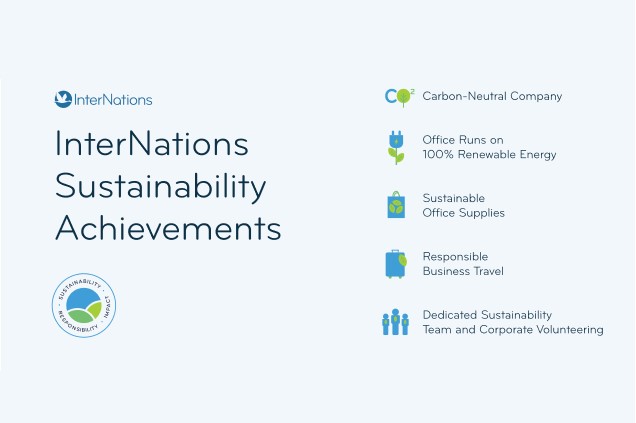For more than a year, international news headlines have been dominated by COVID-19. Despite the ongoing global health crisis, we shouldn’t forget about another pressing issue: the climate crisis. When life around the world finally goes back to normal, we probably shouldn’t go back to business as usual in every respect. The carbon clock is ticking, and it’s time for climate action. The sooner, the better.
In honor of Earth Day (22 April), we have taken action too, joining the LFCA campaign for Earth Day 2021. LFCA is short for Leaders for Climate Action, an initiative by hundreds of digital entrepreneurs who want to share and spread their vision of a sustainable economy. “My co-CEO Philipp and I are committed to taking a stance on climate action, and we are proud members of the Leaders for Climate Action community,” says InterNations Founder & Co-CEO Malte.

Reaching Our First Climate Action Milestone
As part of the “LFCA Green Pledge”, we have appointed a climate officer to measure, reduce, and offset our company’s carbon emissions. Our Feel Good Manager Denise is responsible for this task, as well as the other goals of the InterNations Sustainability Initiative. Denise helped us reach a key milestone in autumn 2020: by calculating our team’s carbon footprint and donating to a climate action project, our office became carbon-neutral half a year ago, offsetting about 100,000 kg in CO2. Our donations went to both two wind power farms overseas and to Plastic Bank, a worldwide ocean protection initiative that helps keep plastic waste from ending up in the ocean and contributes to several UN sustainability goals.
Offsetting carbon emissions was just the beginning. “I think it’s just as important, or even more important, to minimize our company’s carbon footprint!” says Denise. “It is obviously impossible not to cause any carbon emissions at all, but we can figure out what causes them and then try to have as few as possible. Donating to inspiring projects, such as Plastic Bank, is great, but it shouldn’t be all about throwing money at the problem. In the end, we still need to solve it.”
Reducing Carbon Emissions with Remote First
In 2021, reducing the carbon footprint created by our office has been the first step for the InterNations Sustainability Initiative. According to our pre-COVID-19 figures, our team causes an average 220.5 tons in CO2 emissions per year. That’s as much as the annual carbon footprint of 26 EU residents or driving circa 685,000 km in a passenger car — 17 times around the globe!
You’re probably wondering where all these emissions come from. While none of us has made a trip around the world so far, let alone 17, the biggest factor is, in fact, business travel, followed by employees commuting to the office and the somewhat vague category “other emissions”. Of course, the pandemic has put an abrupt end to business trips and our daily commute anyway. Traveling has been replaced by videoconferences, and most of our team members have been working from home for the past twelve months. But, as mentioned above, we can’t just return to business as usual once the pandemic is over.
Our new remote-first policy will definitely help us reduce the carbon emissions caused by employees commuting to the office — most of them will still be working from home at least one or two days a week, perhaps more. It will be interesting to see by how much this policy reduces our carbon footprint. According to a Greenpeace Deutschland study from August 2020, carbon emissions caused by commuters throughout Germany would decrease by 18% if just 40% of employees across the country worked from home for two days a week. So, with the remote-first approach, we should be able to reduce the InterNations Team’s carbon footprint to an even greater degree.
“It’s a good learning from the pandemic situation that not all meetings need to take place in person,” says Denise. “We’ve realized this now since we’re all using videoconferencing tools a lot more. We won’t have to push them actively because we are already used to them. I do think that business trips will resume at one point, but not to the same extent as before.”
We still need an official travel policy to make future trips more eco-friendly, and Denise has already outlined its most important points. Before booking a trip, we need to ask ourselves if it is actually necessary. Perhaps it could be replaced by a virtual meeting just as easily. Our team members will also be encouraged to take the train rather than the plane for domestic travel within Germany or Portugal, as well as similar short-distance journeys.
“It might seem more convenient to book a flight for short trips, but it’s not always the case. You spend so much time going to the airport, waiting at the gate, etc., that you don’t save that much time in the end,” Denise points out. “Personally, I find train rides more relaxing and more efficient than flights. For example, it’s easier to work onboard the train or to take a power nap and arrive well rested.”

Planning for Post-Pandemic Times at the Office
And then there’s that mysterious “other” category. What exactly does it include? Mostly our office supplies, both digital services (e.g., external data storage) and tangible items (e.g., paper, stationary, snacks for the team, etc.). Denise is currently working on reducing the carbon footprint in this category as well. For example, we aim to have a paper-reduced office where people are encouraged to print only what is absolutely necessary and to use eco-friendly printer settings. We will also switch to seasonal, regional, and plant-based catering alternatives.
“I’m afraid there will be no more pineapples, avocados, or strawberries in winter. We should adapt a bit better to what our local environment can provide us with throughout the year. Looking into plant-based catering options will be another issue. As you’re probably aware, animal-based food products have a way higher carbon footprint than plant-based ones and contribute much more to climate change,” Denise emphasizes.
In fact, carbon emissions from plant-based foods are 10 to 50 times smaller than those from animal products, such as meat and dairy. “But that’s a plan for after the pandemic. At least this enforced break gives us the time to brainstorm new ideas and prepare accordingly.”
Calculating Our Digital Carbon Footprint
Data storage — such as the server for our back-up files — is yet another kettle of fish. Data centers are notorious for being environmentally unfriendly. This is for several reasons: To keep servers from overheating, they need to operate in a climate-controlled environment, consuming a lot of energy. They also use coolants that often contain toxic chemicals. Moreover, data centers usually provide battery back-ups in case of power shortages, and used batteries count as hazardous waste.
Working on reducing the environmental impact caused by our digital services ties in neatly with another important point on this year’s sustainability agenda: we need to think beyond the InterNations Team and our office to start tackling the emissions caused by our product itself.
“Whenever you browse the internet or use an app, you also produce carbon emissions,” Denise explains. “Our Business Intelligence Team has all the usage statistics for the InterNations website and our app. We will pass them on to our climate consultant, Climate Partner, and they can make the highly technical calculations required to work out the emissions caused by our online product. Once we get the results, we can proceed just like we did with the company footprint. We can identify the key factors and see where we have the leverage to reduce emissions.”

Fighting Climate Change, One Team Member at a Time
Of course, Denise and her fellow “SustainaBillies” haven’t forgotten about involving the team and keeping their colleagues engaged. “I’m really proud to work for a company that balances the planet, people, and profit,” says Team Lead Community Engagement Nichelle, “and I’ve learned a lot from our sustainability initiative and various team activities.”
So, just like last year, we are going to have several themed months dedicated to all things sustainable, plus an InterNations Social Day for the very first time. So far, we’ve had several fun activities on the topic of eco-friendly fashion and beauty, and we’ll dig deeper into volunteering and activism next. What can each of us do to have a positive impact on our environment?
“There are so many small things you could do to fight climate change. Some of them are so simple and effortless that anyone can implement them in less than five minutes,” says a member of the InterNations SustainaBillies. “Just turn off the tap while brushing your teeth, replace your plastic bags with tote bags, and switch the cling film that you might have used for wrapping food for reusable containers.”
There’s lots to do and no time to lose — so, why not start now?
More ideas, inspiration, and information:
- Browse the suggestions for taking climate action from the “Leaders for Climate Action” campaign and find out how to help save the planet in just five minutes.
- Have a look at this overview of the InterNations Sustainability Initiative and also check out what other members of the LFCA network are doing.
- Browse this year’s Earth Day website for advice on creating your very own “act of green”.
- Calculate your personal carbon footprint and see where you could reduce emissions.
- Have a look at environmental NPOs and NGOs, such as Plastic Bank, and donate to the climate action project of your choice.
- Read more about why your internet habits are not as clean as you might think, the climate impact of meat and dairy, and other topics to become more climate conscious.
Image credit: InterNations / iStockphoto
I am very glad to see that InterNations is taking in a role in battling climate change.
I agree, with video conferencing and the ability that many people have to work from home (at least part of the time), business travel can be reduced significantly.
It appears that Earth Day 2021 is generating a lot interest and encouraging more and more people to take some responsibility in saving our planet.
Tom
@Tom:
Thanks a lot for your feedback, Tom! We’re happy to hear that you like the InterNations Sustainability Initiative, and we also hope that Earth Day 2021 was a source of inspiration for as many people as possible.